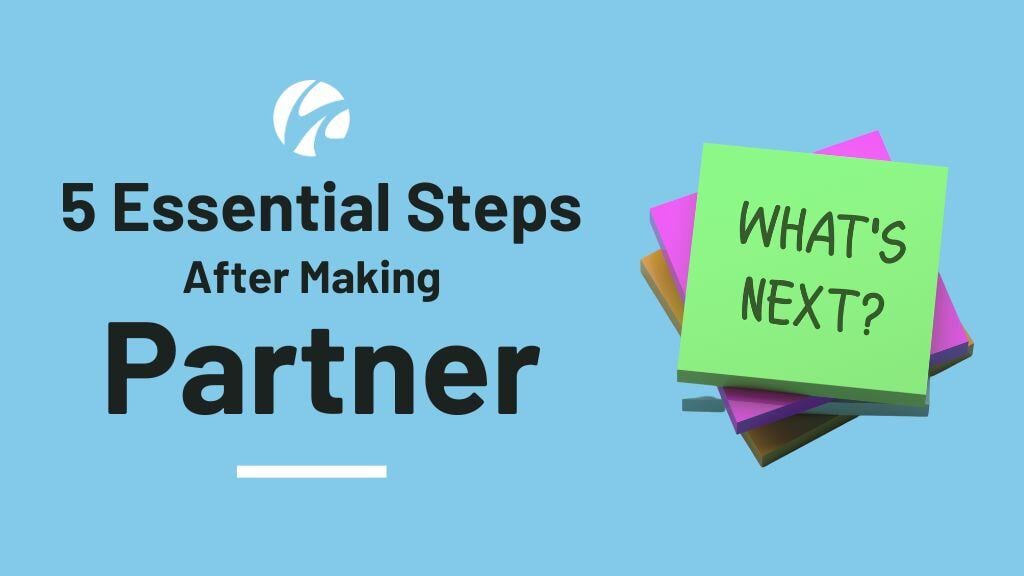3 min read
The Biggest Mistakes New Partners Make and How to Overcome Them
Welcome to the partnership table—where the stakes are higher, the coffee is stronger, and the decisions are bigger. You’ve officially earned your...
5 min read
by:
 Trisha Daho
on
Aug 27, 2024
Trisha Daho
on
Aug 27, 2024

Trisha, a former Big 4 partner, led diverse teams, delivering billions in value for Fortune 500 companies and startups. As a rapid-growth strategist, she created thriving practices and developed leaders who achieved roles like CFOs and CEOs.
Table of Contents

Over the years, I’ve consulted with numerous accounting firms, and a recurring theme is the lack of clear and transparent criteria for becoming a partner. Often, firms either improvise when the time comes or have a vague idea of what constitutes a partner. However, this ambiguity doesn’t aid in evaluating or developing potential partners. When I made partner back in 2006 at a global firm, the guidance I received was simply to “keep doing what I was doing” and that “once you’re already functioning as a partner, we’ll make you one.” As I got closer, I was told I had all the skills, but then it became a waiting game, dependent on economic factors beyond my control. This was incredibly frustrating for someone like me, who thrives on clarity and direction. Unfortunately, even after becoming a partner, the criteria didn’t become any clearer—if anything, they became more opaque.
Becoming a partner in an accounting firm is a significant career milestone, arguably second only to leading a practice or firm or retiring after a successful career. It marks the beginning of an entirely new set of professional expectations. Those of us who are or have been partners remember the process vividly, almost like a personal historical event. I can still recall who called to tell me I’d made it and where I was at that moment. The reasons we aspire to make Partner are as diverse as the reasons we actually do. There’s great value in having a diverse partner group, but even greater power in establishing criteria that embody excellence, foster thriving cultures, and ensure sustainable growth for the firm and its people. Below, I outline a comprehensive approach to creating meaningful criteria that align with the firm’s mission, values, and long-term strategies.
But first, a couple of important reflections…
It took me some time to fully appreciate this, but not everyone wants to be a partner, and that’s perfectly fine. There are many valid reasons someone might choose a different path, and those reasons are none of our business. The key is understanding how that person’s career trajectory aligns with the strategic direction of the firm, and being aware that their vision may evolve over time. It’s crucial to ensure that everyone’s contributions are valued clearly and appropriately, regardless of their path.
Regardless of the path your team members are on, honesty is essential. If someone isn’t on the partner track, let them know as soon as possible. If they are, clearly communicate what still needs to be done to achieve it. Being an inclusive firm means having tough conversations about which behaviors and results need to improve, especially when someone is a potential partner. This feedback should continue even after someone makes partner. The transition to partnership should feel like the beginning of exponential personal and professional growth, not an endpoint. Be honest, but also be supportive.
Now, let’s dive into some clear criteria…
This is obviously foundational, but it’s important to be explicit about expectations. What does it mean to have the requisite experience and expertise?
It’s crucial to assess whether the potential partner has mastered a level of technical expertise that is essential for sustaining and growing the firm. This could be in areas like tax, consulting, audit, or a specific industry expertise. I’m not a big fan of requiring a certain number of years of experience. If the criteria are clearly defined, achieving them will naturally take time.
Also, consider how well the potential partner has demonstrated an ability to build, deepen, and grow client relationships that are important to the firm’s future. There’s value in both expanding existing client relationships and creating new ones that align with the firm’s vision for growth.
Ah, leadership skills! We often talk about them, but rarely do we define what they are and when they’re successfully deployed. In many ways, these skills are more important than technical expertise in the long run. A partner, after many years, will be less involved in the day-to-day work of audit or tax, relying more on their team. So, the ability to inspire and grow people is a must.
There are many types of leaders, each bringing their own personality to the role. For example, I’m an extroverted driver as a leader, and I tend to be laissez-faire with a focus on priorities and quality. One of the best leaders I’ve worked with was an extreme introvert who was hands-off but crystal clear on expectations and goals. Great leaders understand what each person needs and provide it accordingly.
Potential partners should demonstrate the ability to grow a team in areas such as technical aptitude, relationship building, emotional intelligence, project and time management, managing client expectations, decision-making, coaching, resource allocation, and strategic goal-setting. The more you can illustrate what these skills look like in action, the better you and the candidate can assess their readiness for partnership. While these skills may seem harder to define, I challenge you to do so. We know which partners or potential partners excel (or don’t) in these areas, so let’s document it for clarity’s sake. Doing so not only helps in making better decisions but also in defining an intentional culture for the entire firm.
If you have new partners at your firm who are looking to advance their leadership skills, check out Basic Training Bootcamp!
This is one area where most firms tend to have a clear understanding. But there are some key considerations: Does the potential partner understand market trends and the firm’s full range of services? Can they work both individually and as part of a team to deliver all of the firm’s services to a client? Do they know how to leverage digital marketing for brand development and new opportunities?
Many of these skills are not often broken down, but I encourage you to do so. Why? Because the bottom line can be dissected into key skill sets that can be taught and learned. This is where firms often falter—they reward those who generate revenue, but not those who create more partners who can do the same. So, yes, reward those who attract new clients, drive and sustain revenue, and have a deep understanding of how to match the firm’s strengths with market needs. But also, outline the skills required to achieve these results so you can develop the criteria for success and ultimately the training and experience needed for younger leaders to succeed as well.
This alignment is often understood but not formally documented, which can lead to mistakes. Tying these attributes to performance from the start of someone’s career helps establish criteria even for hiring. Can the potential partner demonstrate through their actions that they live the firm’s values and uphold its brand and culture? Can they collaborate effectively when making decisions that impact many people?
I can’t stress enough how important it is for partner groups to make decisions effectively. A key element of success in this area is the ability to consider not only other points of view but also the needs of others and the goals of the firm. Is the potential partner selfish or unethical? You cannot promote someone with a lack of integrity or narcissistic tendencies, no matter how large their book of business. It will always cost you in the end.
This might seem obvious, but we often see partners who avoid conflict or fail to communicate expectations or provide tough feedback. Clearly define what solid communication skills look like. They require courage, integrity, and emotional intelligence. That’s the kind of potential partner you want to promote. Those who don’t develop these skills or aren’t explicitly measured on them often create complex people and culture problems for the firm in the long run.
These criteria may seem like a tall order. Not everyone excels in all of these areas all the time. However, I’d argue that successful partnership requires these skills to be present consistently and at a high level. It is possible, especially when you spell them out for your people early, often, and consistently.
If you have a newer Partner at your firm looking to enhance their soft skills and grow as a leader, I'd recommend they check out our Basic Training Bootcamp program, specifically designed to elevate partners with 0-10 years in the role.

3 min read
Welcome to the partnership table—where the stakes are higher, the coffee is stronger, and the decisions are bigger. You’ve officially earned your...

5 min read
Becoming a partner at an accounting firm isn't just a career milestone—it's a transformative leap that redefines your professional identity. While...

6 min read
In a recent conversation, David Toth, Chief Growth Officer of Winding River Consulting, sat down with Tim Petrey, Managing Partner of HD Growth...